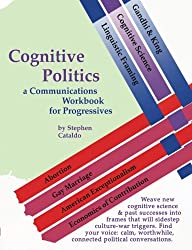United States history is a giant test of high and low-wages on economic growth. In the north, unlike in Europe, the frontier acted much like a natural version of a minimum wage law: if employers couldn't pay to make the job as good as risking your life on the frontier, employees could leave, so wages were higher than any competitor. By the economic theory that higher wages for the front-line workers should mean fewer business opportunities, the northeastern United States should have entered the 20th century an economic backwater unable to compete with Europe, and the low-wage slave-and-im
Just a few key bibliographic links from the book that I think readers are most likely to be interested in:
Here are a variety of framing and messaging resources. Cognitive Politics: a Communications Workbook for Progressives gathers bits and pieces from many of these techniques; much of the political eco-system linked here is more attack-oriented then Cognitive Politics.
For the topic of rape and abortion, what is your standard conversational approach?
Briefly write down a summary of how you talk about abortion:
- What do you say to Pro-Choice liberals?
- What do you say to Pro-Life conservatives?
Afterwards, listen to this:
Workshop -- Healthy Conversations Across Political Divides.
Part of a Transpartisan Meetup.
Cognitive Politics covers framing for four issues, chosen because they best exemplify the framing techniques, not because they are the hot-button issues today. After the book publication, I'll be exploring the framing on more issues. For each hot topic, the (admittedly ambitious) goal is to have both an examination of the framing and a sample comment you can rewrite, make your own, and share. If you would like to be involved, let Stephen know.
Create a list of actions in American history that particularly upset you. Then for each, find someone who opposed it. Integrate the opposition to racism, etc. as your core American story -- something you can feel pride in -- and make the other action into the stain.
Look for stories at http://cognitivepolitics.org/
Robert Reich looks at why there is no revolution or massive progressive reform in the US. I think this is a great list of large, systemic problems weighted against active progressive politics. But it's also missing what we're missing: chickening out on describing where liberals are failing when we could perhaps be succeeding.
Economic elites win when they create a sense of separation between ordinary people. We no longer divide according to "all politics is local," where we fight for our district, or for our economic class. Instead we separate by our psychology into groups that feel good together. One of the biggest issues has been the success of conservatives in pulling the proud, working poor into their camp: Democrats do not give underpaid workers dignity in our rhetoric.
